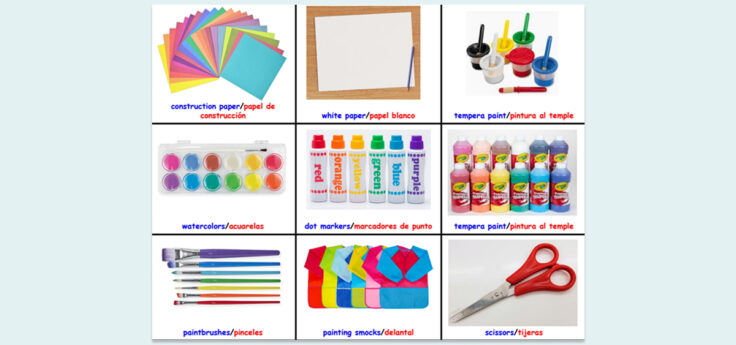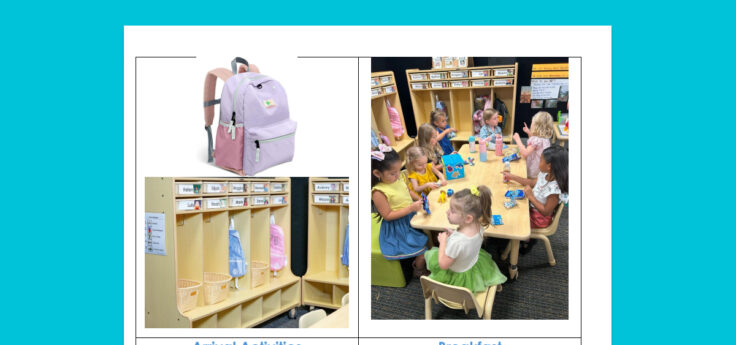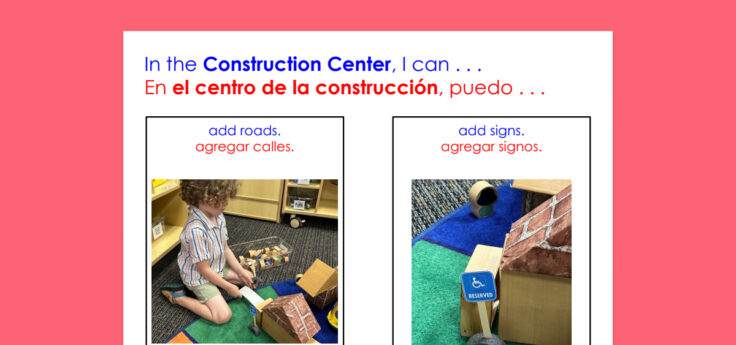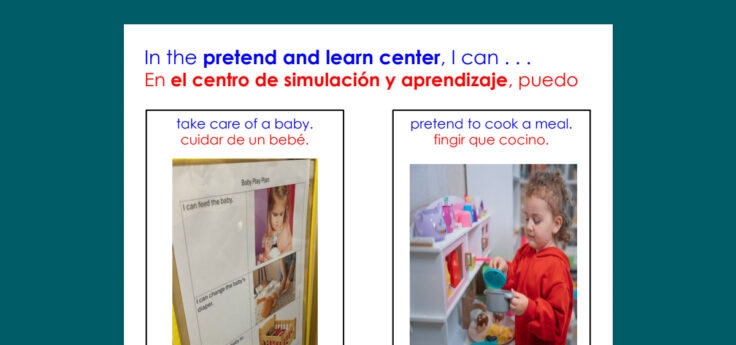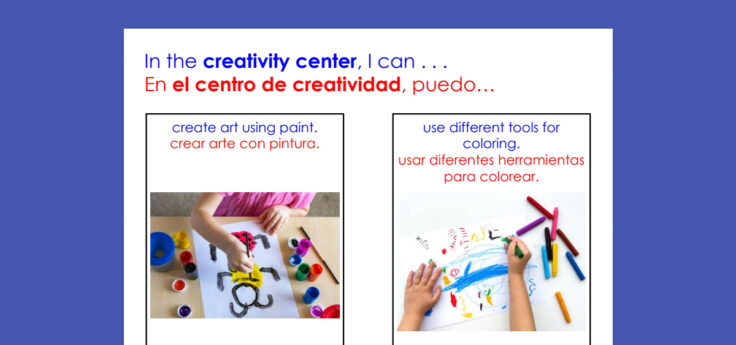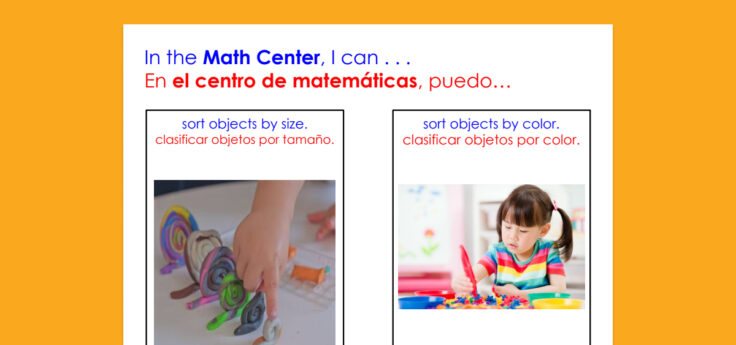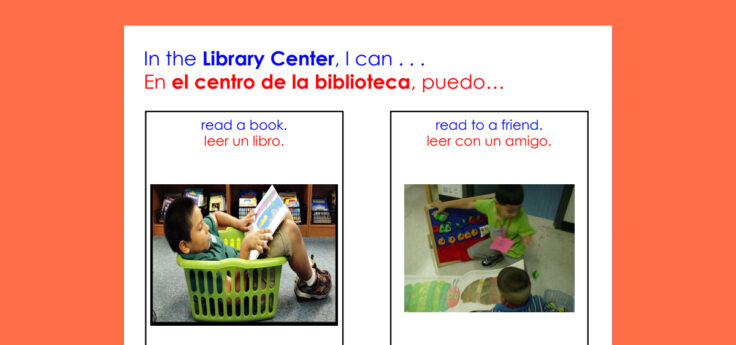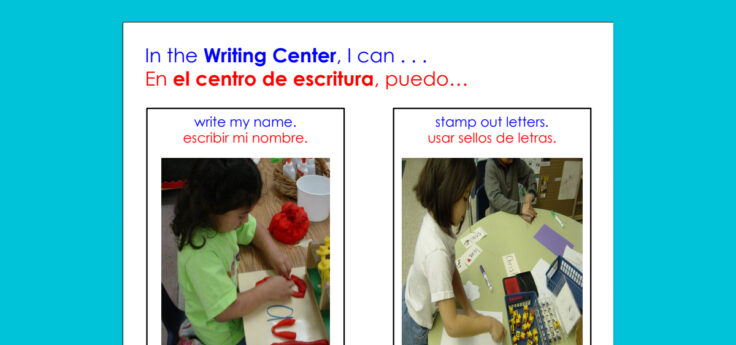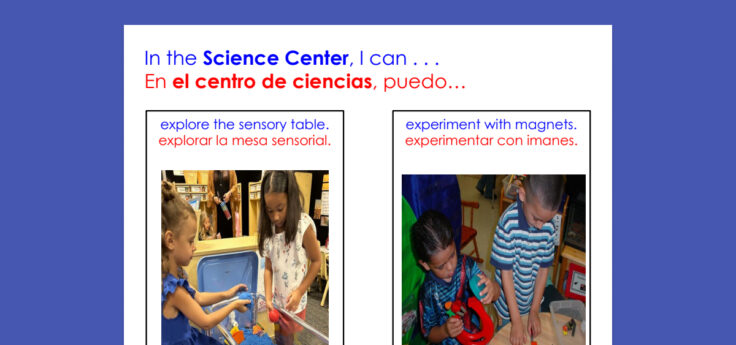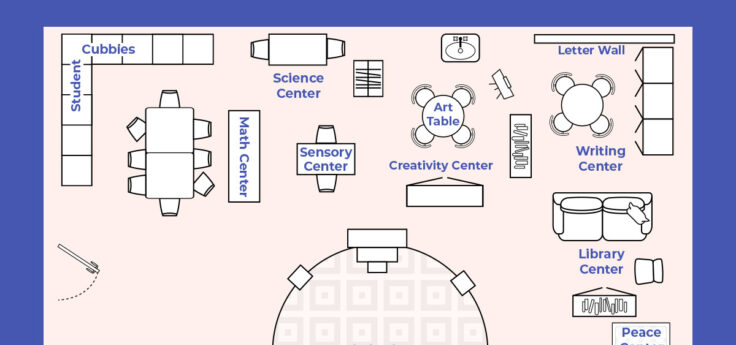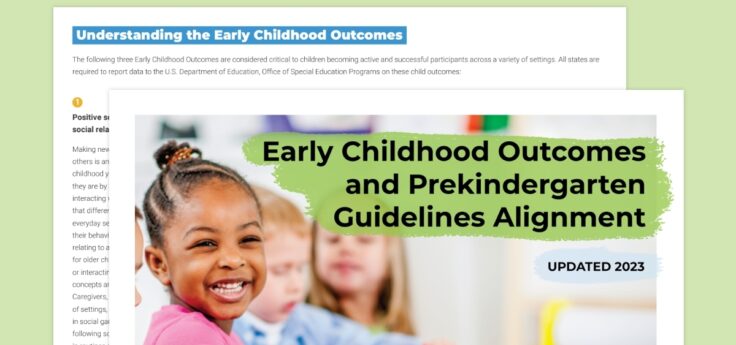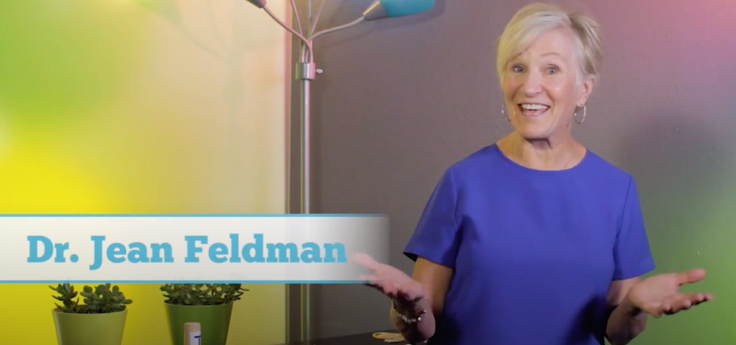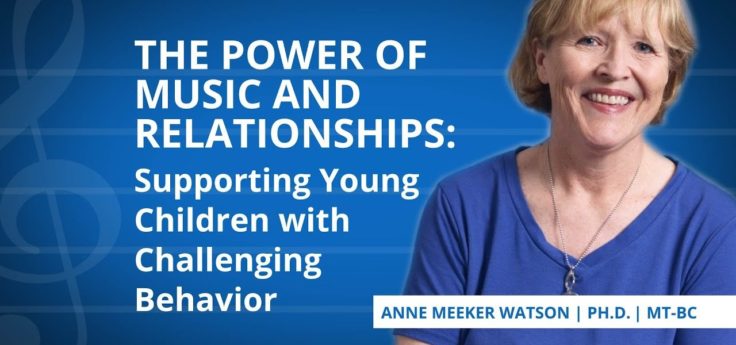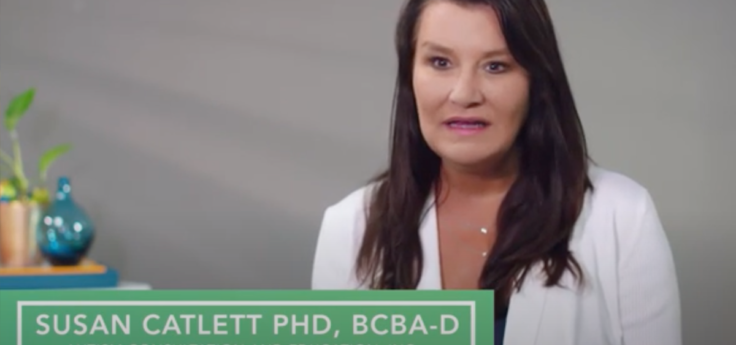Early Childhood Education
Support your school's early childhood education program through workshops, products, resources, consultations, and direct collaboration.
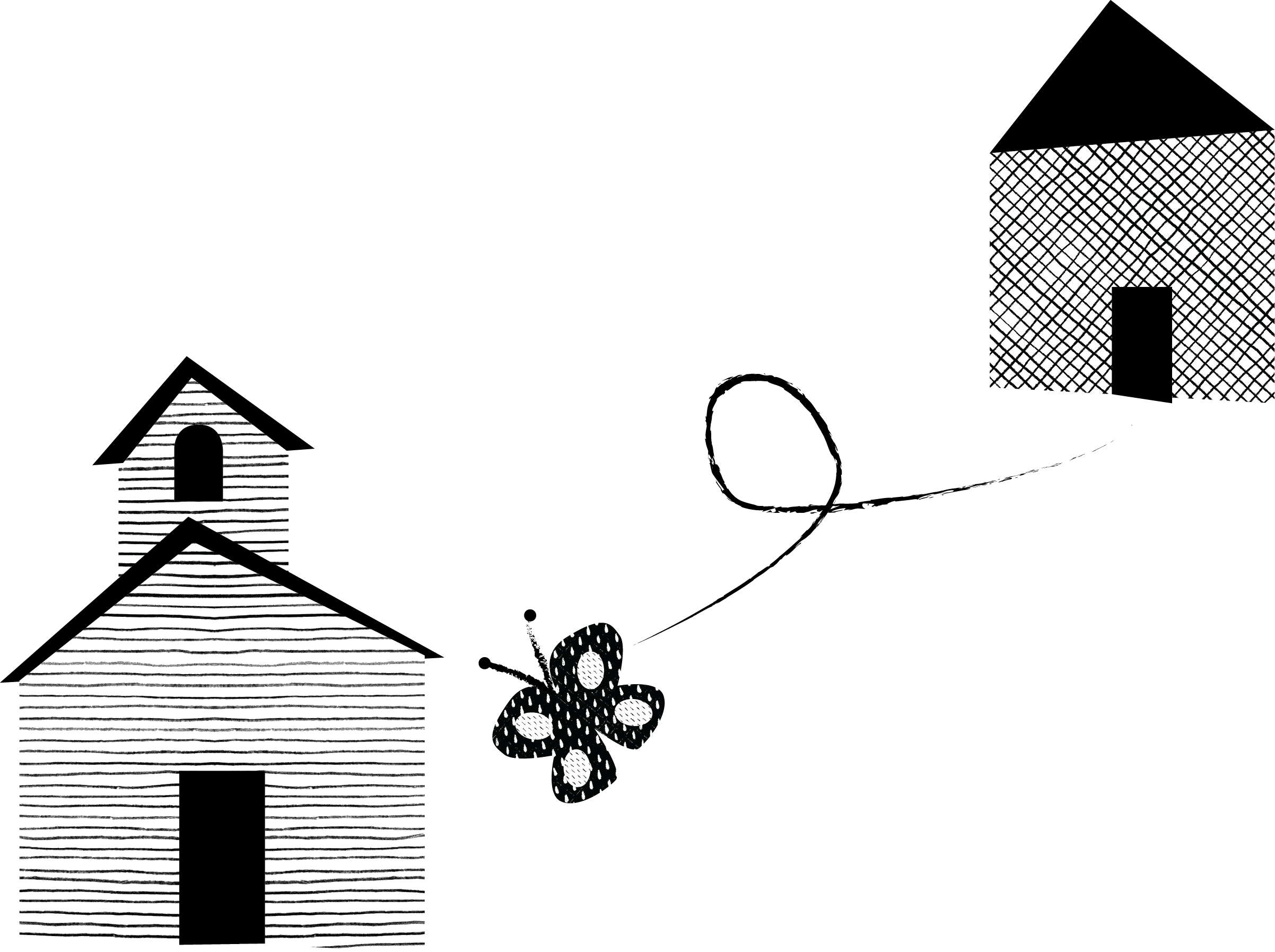
-
![]()
Conference
Early Childhood Conference
Calling all early childhood leaders, educators, and practitioners to come together to connect, collaborate and learn together for two days of exciting sessions.
View Conference Details: Early Childhood Conference -
Service
Texas Reading Academies
House Bill 3 requires that all K-3 teachers and administrators complete the TXRA training within 3 years: 2020-2021, 2021-2022, and 2022-2023.
View Service Details: Texas Reading Academies -
![]()
Coaching

Early Childhood Instructional Coaching Series
Enhance early childhood education through personalized instructional coaching that aligns with HB 3's Pre-K requirements.
View Coaching Details: Early Childhood Instructional Coaching Series -
![]()
Event
2026 Tiny Mathematicians: Inspiring Young Minds Through Early Math Concepts
Learn how to dissect early childhood math standards and effectively translate them into engaging classroom activities!
View Event Details: 2026 Tiny Mathematicians: Inspiring Young Minds Through Early Math Concepts -
![]()
Event
Early Childhood Back to School Bootcamp 2026 (ECSE): Nurturing Young Minds for a Bright Future
Kick off the year with a four-day, hands-on Early Childhood Special Education boot camp featuring practical strategies, evidence-based practices, and optional make-and-take materials for PreK and ECSE settings.
View Event Details: Early Childhood Back to School Bootcamp 2026 (ECSE): Nurturing Young Minds for a Bright Future -
![]()
Workshop
The Pyramid Model for Early Childhood Education: Three Tiers of Support
Three-day, evidence-based training that provides early childhood educators with tiered strategies in universal supports, targeted prevention, and individualized interventions.
View Workshop Details: The Pyramid Model for Early Childhood Education: Three Tiers of Support -
![]()
Series
Early Childhood Leaders and ECSE Coordinators Network
Provides district-level ECSE coordinators, team leaders, and PreK administrators with leadership support, best practices, and TEA updates.
View Series Details: Early Childhood Leaders and ECSE Coordinators Network -
![]()
Resource
Materials Labels (Bilingual)
This includes printable labels that help early childhood teachers organize classroom materials in a way that supports independence, literacy development, and classroom routines.
View Resource Details: Materials Labels (Bilingual) -
![]()
Resource
Sample Visual Daily Schedule (Bilingual)
This visual daily schedule uses pictures to help young children understand and follow the flow of their day, supporting the development of skills related to independence, routine, and transitions, all in alignment with the Texas Prekindergarten Guidelines.
View Resource Details: Sample Visual Daily Schedule (Bilingual) -
![]()
Resource
Construction “I Can” Center Book (Bilingual)
This book guides children with ideas on how they can plan, build, and solve problems using blocks and other materials to create structures and spaces.
View Resource Details: Construction “I Can” Center Book (Bilingual) -
![]()
Resource
Pretend & Learn “I Can” Center Book (Bilingual)
This book guides children with ideas on how they can use imagination, role-play, and everyday materials to act out real-world experiences and build social skills.
View Resource Details: Pretend & Learn “I Can” Center Book (Bilingual) -
![]()
Resource
Creativity “I Can” Center Book (Bilingual)
This book guides children with ideas on how they can use different materials to express themselves through art and build fine motor and creative thinking skills.
View Resource Details: Creativity “I Can” Center Book (Bilingual) -
![]()
Resource
Math “I Can” Center Book (Bilingual)
This book guides children with ideas on how they can explore numbers, patterns, shapes, and measurement through hands-on, playful math activities.
View Resource Details: Math “I Can” Center Book (Bilingual) -
![]()
Resource
Library “I Can” Center Book (Bilingual)
This book guides children with ideas on how they can enjoy books, tell stories, and build language skills while exploring the world through reading.
View Resource Details: Library “I Can” Center Book (Bilingual) -
![]()
Resource
Writing “I Can” Center Book (Bilingual)
This book guides children with ideas on how they can draw, scribble, and experiment with letters to express their thoughts and develop early writing skills.
View Resource Details: Writing “I Can” Center Book (Bilingual) -
![]()
Resource
Science “I Can” Center Book (Bilingual)
This book guides children with ideas on what they can explore, observe, and ask questions about the world around them, through hands-on science investigations.
View Resource Details: Science “I Can” Center Book (Bilingual) -
![]()
Product
Early Childhood Docking Station Signs (11 Bilingual Signs)
Enhance your Early Childhood environment with our set of 11 bilingual center Docking Stations! Designed in both English and Spanish specifically for early learners, these signs help facilitate smooth transitions and foster independence among young students. Key Features: Designed with Best Practice in Mind: Each Center is visually represented by a photo and drawing and shows the maximum number of students allowed in each center. With designated spaces for student photos, kids can quickly see which centers are open and how many friends can join them. Facilitate smooth transitions between activities: By placing stop signs on the docking station, you can easily communicate when a center is closed or limit participation, ensuring a calm and organized environment. Supports Key Developmental Skills: Encourages communication, independence, and responsibility—essential skills for young learners. What's Included Printed Components 11 Fully Laminated Docking Station Signs (8.5 x 14 inches): Each bilingual sign aligns with one of the major learning centers recommended for Pre-K classrooms. 6 Laminated Stop/Alto Tags (7 x 1.5 inches): Communicate closures effectively. Digital Add-Ons Printable Stop/Alto Signs: Downloadable PDF in both English and Spanish, formatted for legal-sized paper (8.5 x 14 inches). Editable Nameplates Template: Provided in MS Word and Google Slides*, this document lets you add student names and photos for easy customization. Print-ready for standard letter size (8.5 x 11 inches). Additional Notes Materials Needed (Not Included): Adhesive-backed Velcro strips, tape, or dots to attach nameplates and Stop/Alto tags to the docking signs. Lamination Requirements: The physical product includes 6 laminated Stop/Alto signs. If additional Stop/Alto signs are needed, they can be printed using the included digital files, but lamination is recommendedd to ensure durability. Nameplates are provided as digital-only files. Upon printing these, lamination is recommended to extend their usability and protect against wear and tear. Google Slides Access: A link to the Google Slides version is included within the MS Word file for easy access. Why You’ll Love This Product Bring structure and ease to your classroom with this must-have tool for center time. The combination of durable, printed materials and customizable digital resources makes it a versatile solution for any early learning environment! For a fully digital version that you can print and customize, click here.
Read Article: Early Childhood Docking Station Signs (11 Bilingual Signs) -
![]()
Product
Early Childhood Docking Station Signs (11 Bilingual Signs) Digital Download PDF
Enhance your Early Childhood environment with our set of 11 bilingual center Docking Stations! Designed in both English and Spanish specifically for early learners, these signs help facilitate smooth transitions and foster independence among young students. Key Features: Designed with Best Practice in Mind: Each Center is visually represented by a photo and drawing and shows the maximum number of students allowed in each center. With designated spaces for student photos, kids can quickly see which centers are open and how many friends can join them. Facilitate smooth transitions between activities: By placing stop signs on the docking station, you can easily communicate when a center is closed or limit participation, ensuring a calm and organized environment. Supports Key Developmental Skills: Encourages communication, independence, and responsibility—essential skills for young learners. What’s Included in Your Digital Download 11 Center Docking Station Posters: Ready-to-print PDFs in both English and Spanish, formatted for legal-sized paper (8.5 x 14 inches). Stop/Alto Signs: A printable PDF with Stop/Alto tags in both English and Spanish, also formatted for legal-sized paper (8.5 x 14 inches). Editable Nameplates Template: Available in MS Word and Google Slides*, this document lets you drop in student photos and type names. Print-ready for standard letter size (8.5 x 11 inches). Additional Notes Materials Needed (Not Included): Adhesive-backed Velcro strips, tape, or dots to attach nameplates and Stop/Alto tags to your docking signs. Lamination Requirements: All components of the digital product, including Docking Station signs, Stop/Alto tags, and nameplates, should be laminated for durability after printing. Google Slides Access: A link to the Google Slides version is included within the MS Word file for easy access. Why You’ll Love This Product Bring structure and ease to your classroom with this must-have tool for center time. The flexibility of this fully digital product makes it an essential resource for any early learning environment! For a printed and laminated version, paired with digital components, click here.
Read Article: Early Childhood Docking Station Signs (11 Bilingual Signs) Digital Download PDF -
![]()
Resource
Early Childhood Model Classroom
A classroom's floor plan, or arrangement, refers to the physical layout of seating, tables, and materials. This arrangement is crucial for creating an environment that supports effective instruction and student growth.
View Resource Details: Early Childhood Model Classroom -
![Light gray t-shirt design that says Tiny Humans are my favorite.]()
Product
Tiny Humans Are My Favorite T-Shirt (Unisex) Light Gray
The Region 13 Early Childhood Summer Conference takes place annually. This t-shirt is a stylish reminder of the vibrant, collaborative, and educational experience that brought together early childhood leaders, educators, and practitioners from all around. Whether you were able to attend the conference or are a dedicated supporter of early childhood education, this t-shirt is a fantastic way to celebrate and promote the vital work you do. This t-shirt is soft and lightweight, with the right amount of stretch. It's comfortable and flattering for all. • 100% combed and ring-spun cotton (Heather colors contain polyester)• Fabric weight: 4.2 oz./yd.² (142 g/m²)• Pre-shrunk fabric• Side-seamed construction• Shoulder-to-shoulder taping• Blank product sourced from Nicaragua, Mexico, Honduras, or the USThis product is made especially for you as soon as you place an order, which is why it takes us a bit longer to deliver it to you. Making products on demand instead of in bulk helps reduce overproduction, so thank you for making thoughtful purchasing decisions! Size guide LENGTH (inches) WIDTH (inches) CHEST (inches) XS 27 16 ½ 31-34 S 28 18 34-37 M 29 20 38-41 L 30 22 42-45 XL 31 24 46-49 2XL 32 26 50-53 3XL 33 28 54-57 4XL 34 30 58-61 5XL 35 31 62-65
Read Article: Tiny Humans Are My Favorite T-Shirt (Unisex) Light Gray -
Video
Early Childhood Best Practices Video Series
Early childhood educators demonstrate how to align their classroom environments and teaching to best practices in this series.
View Video Details: Early Childhood Best Practices Video Series -
![]()
Resource
Early Childhood Outcomes and Prekindergarten Guidelines Alignment
Early Childhood Outcomes and Prekindergarten Guidelines Alignment helps design preschool instruction to align with each of the Texas Education Agency’s prekindergarten guidelines to one or more of the three early childhood outcomes.This document connects the d
View Resource Details: Early Childhood Outcomes and Prekindergarten Guidelines Alignment -
![Preview of the blue and white front cover of the Texas Prekindergarten Guidelines Spanish (Spiral-Bound) book. The front cover features children playing with blocks, educational toys, and gardening.]()
Product
Texas Prekindergarten Guidelines - Spanish (Spiral-Bound)
Use Texas Prekindergarten Guidelines to design meaningful and purposeful experiences for young children to provide them a foundation that guides their growth in all aspects of development. The Texas Prekindergarten Guidelines are based on current knowledge of theory and scientific research about how children develop and learn. The guidelines: Reflect the growing consensus among early childhood professional organizations that a greater emphasis be placed on young children’s conceptual learning, acquisition of basic skills and participation in meaningful, relevant learning experiences. Provide professional development as the key to high-quality prekindergarten programs, the involvement of families for better school readiness of children, strategies for bilingual instruction, considerations for children with special needs and disabilities, and methods for monitoring children’s progress. Are intended to be useful to a broad audience, including school districts, Head Start programs, child care providers, and, most importantly, children’s families. Provide a means to align prekindergarten programs with the Texas Essential Knowledge and Skills (TEKS). The print edition of this document is offered here as a service to our customers at no profit to ESC Region 13 - the purchase price covers professional color printing and binding. A PDF version of this document can be downloaded free from TEA’s website. ESF Alignment Spiral-bound, 140 pages Texas Prekindergarten Guidelines was written by TEA and printed and bound by Education Service Center Region 13.
Read Article: Texas Prekindergarten Guidelines - Spanish (Spiral-Bound) -
![Computer screen with a light blue background displaying the TexGuide Pre-K logo.]()
Product
TExGUIDE Pre-K
TExGUIDE Pre-K provides early childhood teachers with a bridge between curriculum, aligned resources, and instructional planning. This guide allows teachers the flexibility to organize, sequence, and customize guides to meet students’ learning needs. This increases the efficiency, quality, and alignment of lesson planning for teachers, which directly impacts student learning outcomes. TExGUIDE Pre-K is available for purchase to all educators across the state of Texas, regardless of subscription with TEKS Resource System. TExGUIDE Pre-K is included in the K-12 TExGUIDE product. TExGUIDE Pre-K is aligned with the Texas Education Agency Pre-K Guidelines. Each guide includes: Topic Overview Relevant and easily accessible resources Student expectations with aligned learning activities Language and communication strategies toolkit Formative assessment checklists to track ongoing student progress TExGUIDE PRE-K Annual Product and Pricing Table - calculated using Fall PEIMS Enrollment Districts with fewer than 50 Pre-K Students Total Cost = $250 Districts with greater than 50 Pre-K students Total Cost = $5 x PreK Enrollment (Fall PEIMS submission) ESF Alignment Supports Lever 5.1 - Effective classroom routines and instructional strategies
Read Article: TExGUIDE Pre-K -
![Preview of the blue illustrated cover featuring clouds, a tree, music notes, confetti, papel picado, balloons, and six children holding hands and smiling on the front of Region 13's Canciones y rondas infantiles - Student Version books.]()
Product
Canciones y rondas infantiles - Student Version (5-Pack – Booklets – Saddle-Stitch)
The Canciones y rondas infantiles is a compilation of many of the traditional songs that are sung in Latin America and in bilingual classrooms in the US. Teachers using this resource will notice the reader-friendly print and animated illustrations that help our young learners connect print and speech. The Canciones y rondas infantiles includes: 5 copies (8" x 12") on hardy card-stock, designed for student use. 20 authentic songs. Various language structures to support oracy development. Playful nursery rhymes that encourage interaction and play such as A la víbora de la mar, Arroz con leche. TEKS alignment provided to support instructional integration of this resource. We know this resource will provide authentic language structures to support oral language development through vocabulary development and dialogue. ¡A cantar se dijo! Saddle-Stitched, 8" x 12", 32 pages, 5 Booklets The Canciones y rondas infantiles was produced and is maintained by the team of Multilingual Language and Learning Support Specialists at Region 13.
Read Article: Canciones y rondas infantiles - Student Version (5-Pack – Booklets – Saddle-Stitch) -
![Preview of the blue illustrated cover featuring clouds, a tree, music notes, confetti, papel picado, balloons, and six children holding hands and smiling on the front of Region 13's Canciones y rondas infantiles - Teacher Version.]()
Product
Canciones y rondas infantiles - Teacher Version (Spiral-Bound Big Book)
The Canciones y rondas infantiles songbook is a compilation of many of the traditional songs that are sung in Latin America and in bilingual classrooms in the US. Teachers using this resource will notice the reader-friendly print and animated illustrations that help our young learners connect print and speech. The Canciones y rondas infantiles includes: 20 authentic songs. Various language structures to support oracy development. Playful nursery rhymes that encourage interaction and play such as A la víbora de la mar and Arroz con leche. TEKS alignment to support instructional integration of this resource. We know this resource will provide authentic language structures to support oral language development through vocabulary development and dialogue. ¡A cantar se dijo! Need to hear some of the songs in this product? We've put together a playlist in Spotify with some examples. Check it out here. Spiral-Bound, 13" x 20", 34 pages The Canciones y rondas infantiles was produced and is maintained by the team of Multilingual Language and Learning Support Specialists at Region 13.
Read Article: Canciones y rondas infantiles - Teacher Version (Spiral-Bound Big Book) -
![]()
Video
Making Learning and Teaching Fun! with Dr. Jean
Join Dr. Jean Feldman as she explores how to make learning and teaching fun for your young students!
View Video Details: Making Learning and Teaching Fun! with Dr. Jean -
![]()
Video
The Power of Music and Relationships
Dr. Anne Meeker Watson specializes in helping young children through music therapy and explores the power of music in building relationships with young students.
View Video Details: The Power of Music and Relationships -
![]()
Video
Changing Behavior in Preschool Classrooms
Dr. Susan Catlett explores the functions of behavior in a preschool classroom and how you can change behavior for the better.
View Video Details: Changing Behavior in Preschool Classrooms -
![]()
Article
Classroom Setup During COVID-19: Using Picture Visuals
Hi there, friends. In the previous blog about setting up your classroom during Covid-19, we explored how to use floor tape to increase student understanding of visual boundaries and expectations. Remember, visual supports, which include visual boundaries, visual cues, and visual schedules, are evidence-based practices that we should be using ALL the time, not just […]
Read Article: Classroom Setup During COVID-19: Using Picture Visuals -
![]()
Product
2023 Prekindergarten Center Alignment Posters (Set of 11)
Use the 2023 Prekindergarten Center Alignment Posters to show how your Pre-K classroom learning centers align with current best practices and Pre-k Guidelines. Center play is learning! Each of these 11 full-color posters: aligns with one of the major learning centers recommended for the Pre-K classroom. explains the skills targeted for the associated learning center. references Pre-K guidelines across multiple domains that can be practiced while playing in each center. provides open-ended questions to help you start meaningful play interactions. These posters are appropriate for Pre-K early childhood, ECSE, Head Start, and childcare centers. They are also available in a Spanish language version. ESF Alignment Supports Lever 5.1 - Effective classroom routines and instructional strategies 11 full-color posters 2023 Prekindergarten Alignment Posters were produced and are maintained by the Special Education Specialists at Region 13.
Read Article: 2023 Prekindergarten Center Alignment Posters (Set of 11) -
![Cover image of four children doing arts and crafts with paper and crayons on the front of the Region 13 Early Childhood Outcomes and Prekindergarten Guidelines Alignment (Spiral-Bound) book.]()
Product
Early Childhood Outcomes and Prekindergarten Guidelines Alignment (Spiral-Bound)
The Early Childhood Outcomes and Prekindergarten Guidelines Alignment helps design preschool instruction to align with each of the Texas Education Agency’s prekindergarten guidelines to one or more of the three early childhood outcomes. This document connects the developmental continuum of skills to the prekindergarten guidelines to help educators design appropriate, individualized goals and interventions for the youngest learners who are developmentally functioning below four-year-old expectations. This includes students with disabilities, students learning English as a second language, and any child who may be at risk educationally. The developmental continuum includes foundational skills that will lead to expected three-year-old and four-year-old skills, which can be used to provide a direct link to the prekindergarten guidelines and function as a starting point for students who are furthest from age-appropriate skill levels when they enter Early Childhood Special Education Programs. The print edition of this document is offered here as a service to our customers at no profit to ESC Region 13 - the purchase price covers professional color printing and binding. A PDF version of this document can be downloaded free from TEA’s website. ESF Alignment Supports Lever 4.1 - Daily use of high-quality instructional materials aligned to instructional planning calendars and interim and formative assessments Spiral-bound, 180 pages Early Childhood Outcomes and Prekindergarten Guidelines Alignment was produced by Region 13 through a TEA grant and has been revised and maintained by Region 13 to reflect the 2015 Prekindergarten Guidelines.
Read Article: Early Childhood Outcomes and Prekindergarten Guidelines Alignment (Spiral-Bound) -
![]()
Product
2024 Prekindergarten Alignment Posters - Spanish (Set of 11)
Use the 2024 Prekindergarten Guidelines Alignment Posters to create Pre-K classroom learning centers that align with current best practices. Each of these 11 full-color posters: Aligns with one of the major learning centers recommended for the Pre-K classroom. Explains the skills targeted for the associated learning center Provides open-ended questions to help you start meaningful play interactions. These posters are appropriate for Pre-K early childhood, ECSE, Head Start, and childcare centers. They are also available in an English language version. ESF Alignment Supports Lever 5.1 - Effective classroom routines and instructional strategies 11 full-color posters 2024 Prekindergarten Alignment Posters were produced and are maintained by the Special Education Specialists at Region 13.
Read Article: 2024 Prekindergarten Alignment Posters - Spanish (Set of 11) -
![Preview of the blue and white front cover of the Texas Prekindergarten Guidelines (Spiral-Bound) book. The front cover features children playing with blocks, educational toys, and gardening.]()
Product
Texas Prekindergarten Guidelines (Spiral-Bound)
Use Texas Prekindergarten Guidelines to design meaningful and purposeful experiences for young children to provide them a foundation that guides their growth in all aspects of development. The Texas Prekindergarten Guidelines are based on current knowledge of theory and scientific research about how children develop and learn. The guidelines: Reflect the growing consensus among early childhood professional organizations that a greater emphasis be placed on young children’s conceptual learning, acquisition of basic skills and participation in meaningful, relevant learning experiences. Provide professional development as the key to high-quality prekindergarten programs, the involvement of families for better school readiness of children, strategies for bilingual instruction, considerations for children with special needs and disabilities, and methods for monitoring children’s progress. Are intended to be useful to a broad audience, including school districts, Head Start programs, child care providers, and, most importantly, children’s families. Provide a means to align prekindergarten programs with the Texas Essential Knowledge and Skills (TEKS). The print edition of this document is offered here as a service to our customers at no profit to ESC Region 13 - the purchase price covers professional color printing and binding. A PDF version of this document can be downloaded free from TEA’s website. ESF Alignment Spiral-bound, 87 pages Texas Prekindergarten Guidelines was written by TEA and printed and bound by Education Service Center Region 13.
Read Article: Texas Prekindergarten Guidelines (Spiral-Bound) -
![]()
Product
Early Childhood Circle Time Flip Charts (Downloadable PDFs)
The Early Childhood Circle Time Flipcharts include 9 downloadable PDF posters that each depict one activity commonly taught during circle time, as well as a Supplemental Materials Packet and an Instructional Guide. Activities (posters) include: Opening Song Student Sign In Calendar Story Song Choice Social Skills Weather Surprise Sound Center Choice. The following recommendations can ensure that teachers purchasing the digital download can use this resource for years to come: Print these posters on 11x17 paper. Laminate both the posters and the supplemental materials. If laminating is not an option, print them out on heavy card stock. Place velcro (not included) in the appropriate places to make the flip charts interactive for your students. Place soft (female) velcro in the flip chart, and rough (male) velcro on the supplemental materials to increase longevity. This product is an example of the evidence based practice, Visual Supports, and is appropriate for ECSE (Early Childhood Special Education), Pre-K early childhood, Head Start and childcare centers. They are also available in a Spanish Language Version. ESF Alignment Supports Lever 5.1 - Effective classroom routines and instructional strategies. 3 downloadable PDFs, varying lengths
Read Article: Early Childhood Circle Time Flip Charts (Downloadable PDFs) -
![Preview of the colorful imagery and graphics on the Early Childhood Circle Time Flip Charts including drawings of a trumpet, a person singing, a school bus, a baby crawling, a teddy bear, the sun, rain, wind, and a person driving.]()
Product
Early Childhood Circle Time Flip Charts (Set of Posters)
The Early Childhood Circle Time Flip Charts include 9 posters that each depict one activity commonly taught during circle time, as well as a Supplemental Materials Packet and an Instructional Guide. Activities (posters) include: Opening Song Student Sign In Calendar Story Song Choice Social Skills Weather Surprise Sound Center Choice. Teachers purchasing this resource should keep in mind that there are materials in the Supplemental Materials packet that should be laminated to ensure that this resource can be used for years to come. Place velcro (not included) in the appropriate places to make the flip charts interactive for your students. Place soft (female) velcro in the flip chart, and rough (male) velcro on the supplemental materials to increase longevity. This product is an example of the evidence based practice, Visual Supports, and is appropriate for ECSE (Early Childhood Special Education), Pre-K early childhood, Head Start and childcare centers. They are also available in a Spanish Language Version. ESF Alignment Supports Lever 5.1 - Effective classroom routines and instructional strategies 10 11"x17" posters Supplemental materials, 17 pages Instruction Sheets, 9 pages
Read Article: Early Childhood Circle Time Flip Charts (Set of Posters) -
![Preview of the colorful imagery and graphics on the Early Childhood Circle Time Flip Charts including drawings of a trumpet, a person singing, a school bus, a baby crawling, a teddy bear, the sun, rain, wind, and wheels and a group of people standing together.]()
Product
Early Childhood Circle Time Flip Charts - Spanish (Set of Posters)
The Early Childhood Circle Time Flip Charts include 9 posters that each depict one activity commonly taught during circle time, as well as a Supplemental Materials Packet and an Instructional Guide. Activities (posters) include: Opening Song Student Sign In Calendar Story Song Choice Social Skills Weather Surprise Sound Center Choice. Teachers purchasing this resource should keep in mind that there are materials in the Supplemental Materials packet that should be laminated to ensure that this resource can be used for years to come. Place velcro (not included) in the appropriate places to make the flip charts interactive for your students. Place soft (female) velcro in the flip chart, and rough (male) velcro on the supplemental materials to increase longevity. This product is an example of the evidence-based practice, Visual Supports, and is appropriate for ECSE (Early Childhood Special Education), Pre-K early childhood, Head Start and childcare centers. They are also available in an English Language Version. ESF Alignment Supports Lever 5.1 - Effective classroom routines and instructional strategies 10 11"x17" posters Supplemental materials, 17 pages Instruction Sheets, 9 pages
Read Article: Early Childhood Circle Time Flip Charts - Spanish (Set of Posters) -
![]()
Product
Early Childhood Circle Time Flip Charts - Spanish (Downloadable PDFs)
The Early Childhood Circle Time Flip Charts include 9 downloadable PDF posters that each depict one activity commonly taught during circle time, as well as a Supplemental Materials Packet and an Instructional Guide. Activities (posters) include: Opening Song Student Sign In Calendar Story Song Choice Social Skills Weather Surprise Sound Center Choice. The following recommendations can ensure that teachers purchasing the digital download can use this resource for years to come: Print these posters on 11x17 paper. Laminate both the posters and the supplemental materials. If laminating is not an option, print them out on heavy card stock. Place velcro (not included) in the appropriate places to make the flip charts interactive for your students. Place soft (female) velcro in the flip chart, and rough (male) velcro on the supplemental materials to increase longevity. This product is an example of the evidence based practice, Visual Supports, and is appropriate for ECSE (Early Childhood Special Education), Pre-K early childhood, Head Start and childcare centers. They are also available in an English Language Version. ESF Alignment Supports Lever 5.1 - Effective classroom routines and instructional strategies 3 downloadable PDFs, varying lengths
Read Article: Early Childhood Circle Time Flip Charts - Spanish (Downloadable PDFs)
Supporting Early Childhood Education
Early childhood education is your student's first connection between home and learning at school. It sets students on their path to being part of a learning community through the development of social-emotional skills and foundational concepts. Early Childhood Education cultivates a partnership between school and family to help ensure the success of every student. That's why continuous support and growth through professional development for early childhood educators is so important.
Our early childhood specialists provide workshops, instructional coaching, and resources to districts, Head Start organizations, and childcare centers. This professional development for early childhood educators helps build high-quality early childhood programs that develop school-ready students.
Need to get in touch?
Contact a member of our team for more information.





